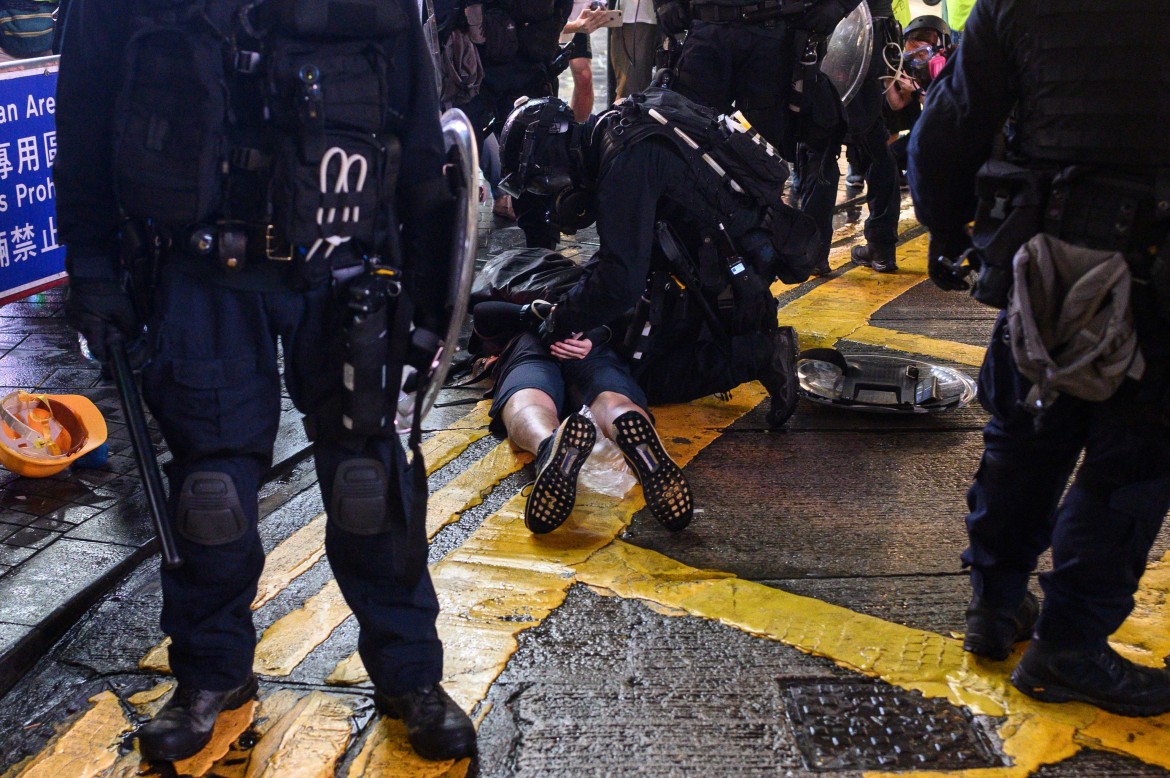#HongKong police rushed into MTR station to attack protesters brutally. This video is self-explanatory.#PoliceBrutality #FreedomHK #antiELAB #StandWithHK pic.twitter.com/PkXsHStMqG
— Freedom HK (@FreedomHKG) August 31, 2019
Analysis
Nights of violence in Hong Kong, where local police are trying to cut off the protests
The protests in Hong Kong are complex, but the loudest cries are for universal suffrage. Beijing, however, has rejected the governor's compromise offers, dashing hopes of a mediation. The mainland seems to favor a resolution by force.

This past weekend saw a significant escalation in the confrontations between protesters and police in Hong Kong. At the end of a day marked by clashes, forceful interventions and Molotov cocktails, on Saturday evening police decided to corner the demonstrators in a number of metro stations (Mong Kok and Prince Edward), leading to cracked skulls and many people injured.
The images and videos recorded by the protesters and spread via Telegram accounts speak for themselves. The police have even resorted to closing the entrances of the metro stations in order to make arrests and prevent any outside aid to those trapped inside.
Throughout the day, the protesters had not backed off from the struggle. They attempted a number of times to penetrate the Legislative Council building, proving they were prepared for clashes with the police, who, as the images show, are making extensive use of agents provocateurs as well as of water cannons and tear gas. Toward evening, however, everything took a much more violent turn than before, after the bulk of the activists ostensibly joined up with a procession organized by a Christian community to try to dodge the ban on demonstrations.
What is happening on the ground marks a watershed in the lingering conflict that has brought Hong Kong into the focus of worldwide attention for months now, one which must be understood in all its implications.
At the moment, we only know some aspects of it, while others remain unknown. We know protesters are calling for different things: first and foremost, the majority of them are calling for universal suffrage, a demand that can fit within the “one country, two systems” theory favored by Beijing and is based on the guarantees recognized in the constitution of the former colony, ratified by Beijing as well. Some of the protesters certainly have further ambitions, aimed toward independence, while others are looking to the US for support.
These different orientations combined have led to a movement with a wide constituency. But the most visible, in the end, are those who are the best organized—such as Joshua Wong’s group, which is certainly motivated by good intentions, but has often been in contact with US diplomatic and political staff (one of the photos circulating shows him together with Marco Rubio, nobody’s shining example of a progressive politician).

These ties have consequences. China can make accusations of foreign interference, a claim bolstered by the fact that the factions less interested in copying the example of American democracy are playing a less prominent role in the movement. One should also keep another aspect in mind: there has been a longstanding debate in Hong Kong about how to improve the lives of workers, solve the housing problem and better the harsh living conditions of many immigrants; however, these issues do not seem to show up among the slogans of the protesters.

Furthermore, we should also point out something that only adds to the complexity of what is happening in Hong Kong: the divided intentions of the government. It is well known that Carrie Lam, the governor of Hong Kong, is doing the bidding of Beijing, but her attempt to propose a number of compromises (that would be acceptable to China as well) was turned down by the Chinese side. This means that most likely, no mediation will be possible.
At this point, we must therefore be brutally honest when asking ourselves what might be the aftermath of this summer of protests in Hong Kong. At the moment, China seems to be relying entirely on the local police: the repression during the past few days, the rounding up of protesters and the violent street interventions on Saturday seem to have been the result of Beijing giving the full go-ahead to resolve this matter, using the local police as enforcers.
If this attempt ultimately fails, one can think of even worse consequences to follow. What is certain is that Oct. 1 will mark the 70-year anniversary of the People’s Republic of China—and it’s a safe bet that Beijing wants a Hong Kong that is “pacified” before then.
Originally published at https://ilmanifesto.it/notte-di-violenza-a-hong-kong-la-polizia-carica-anche-in-metro/ on 2019-09-01
